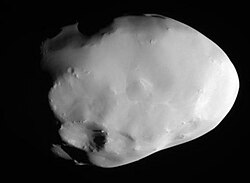Telesto (moon)

Telesto as seen by the Cassini probe in October 2005
|
|
| Discovery | |
|---|---|
| Discovered by |
|
| Discovery date | April 8, 1980 |
| Orbital characteristics | |
| 294619 km | |
| Eccentricity | 0.000 |
| 1.887802 d | |
| Inclination | 1.19° (to Saturn's equator) |
| Satellite of | Saturn |
| Physical characteristics | |
| Dimensions | 32.6 × 23.6 × 20.0 km |
|
Mean radius
|
12.4±0.4 km |
| synchronous | |
| zero | |
| 18.7 | |
Telesto (/tᵻˈlɛstoʊ/ tə-LES-toh, Greek: Τελεστώ) is a moon of Saturn. It was discovered by Smith, Reitsema, Larson and Fountain in 1980 from ground-based observations, and was provisionally designated S/1980 S 13. In the following months, several other apparitions were observed: S/1980 S 24,S/1980 S 33, and S/1981 S 1.
In 1983 it was officially named after Telesto of Greek mythology. It is also designated as Saturn XIII (13) or Tethys B.
Telesto is co-orbital with Tethys, residing in Tethys' leading Lagrangian point (L4). This relationship was first identified by Seidelmann et al. in 1981. Another moon, Calypso, resides in the other (trailing) Lagrangian point of Tethys, 60 degrees in the other direction from Tethys. The Saturnian system has two additional trojan moons.
The Cassini probe performed a distant flyby of Telesto on October 11, 2005. The resulting images show that its surface is surprisingly smooth, devoid of small impact craters.
...
Wikipedia
